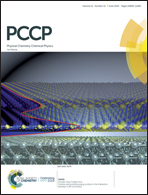Role of native defects and the effects of metal additives on the kinetics of magnesium borohydride
Abstract
Magnesium borohydride (Mg(BH4)2) has been considered as a potential material for hydrogen storage. In this paper, density functional theory studies have been carried out on native point defects and electrically active impurities (Ni and Ti) in Mg(BH4)2. A detailed analysis of the geometrical structures, energetics and migration of the defects reveals that hydrogen related defects are charged and their formation energies are Fermi-level dependent. We propose a specific mechanism for the decomposition of Mg(BH4)2: the self-diffusion of Mgi2+ is the rate-limiting process for decomposing Mg(BH4)2. Moreover, Ni and Ti impurities can tailor the hydrogen desorption kinetics of Mg(BH4)2 by shifting the Fermi level, but the effects of impurities on shifting the Fermi levels are related to how the impurity is incorporated into Mg(BH4)2.



 Please wait while we load your content...
Please wait while we load your content...